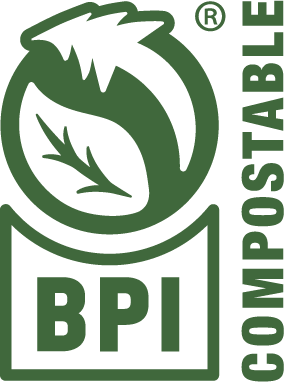What are compostable plastics…? We know that when it comes to zero-waste, food scrap collection, composting, and bioplastics, there can be a lot of questions – because of this, we’ve created detailed responses to some frequently asked questions below.
Do Natur-Bag® products meet any standards?
| Yes, they meet the following: | |
 | Natur-Bag® Approved! The Biodegradable Products Institute (BPI), provides an independent certification program for products that meet all requirements of the ASTM D6400 standard.
|
 | Natur-Bag® Approved! TÜV Austria, an Austrian specification, provides an independent certification program for products that meet all requirements of the European EN13432 standard. |
 | Natur-Bag® Products are Approved for Use in Cedar Grove! The Compost Manufacturing Alliance (CMA) is a global leader in providing industrial composting facilities an acceptance standard for compostables by performing field disintegration testing through several prominent processing methods to ensure products sent to industrial compost facilities adequately break down within the production cycle.
Cedar Grove is the largest compost facility in the US Pacific NW. Cedar Grove mandates that all compostable plastic products be evaluated and approved before accepting them in their compost system, which requires a 50-day biodegradation window. |
 | Natur-Bag® Approved! The USDA BioPreferred® program specifies the percentage of biobased material in a product or package. This percentage is determined by measuring the ratio of carbon-14 (new carbon) to carbon-12 (old carbon) in accordance with ASTM D6866. The purpose of the BioPreferred program is to promote the use of biobased products. |
 | Natur-Bag® Approved! The OK Biobased certification, provided by TÜV Austria, is an independent evaluation of the renewable carbon content in a product. On the basis of the determined percentage of renewable raw materials (% Biobased), the product can be certified as one-star-biobased (20% – 40% biobased content), all the way up to four-star biobased (upwards of 80% biobased content). |
 | The Australian Bioplastics Association (ABA) represents members in promotion and advocacy for members’ products throughout Australia and New Zealand. The Association administers a voluntary scheme for verification of products for members and non-members for compliance with the Australian Standard AS 4736-2006-Biodegradable plastics for composting and other microbial treatment. |
What is ASTM D6868?
ASTM Method D6866 is the US government-approved method for determining the renewable/biobased content of natural range materials, including ethanol additives, bio-diesel additives, and biobased products.
ASTM D6866 is recognized by regulators and companies worldwide as a valid tool for quantifying the renewable carbon content of biobased products. It is routinely used by companies and organizations worldwide that need to:
- Validate the renewable carbon content of compounds
- Re-formulate compounds that previously were entirely petrochemical
- Validate the renewable claims of raw materials supplies
- Research and develop alternative products with renewable content
- Obtain marketing data to support renewable claims
- Obtain data to support regulatory requirements
What is ASTM D6400?
The ASTM D6400 Standard for compostable plastics specifies three criteria for compostability
- The Mineralization
- At least 90% conversion of carbon dioxide, water, and biomass via microbial assimilation
- Occurs at the same rate as natural materials (i.e., leaves, grass, food scraps)
- Occurs within a time period of 180 days or less
- Disintegration
- Less than 10% of test material remains on a 2mm sieve
- Safety
- No impact on plants, using OECD Guide 208
- Regulated (heavy metals less than 50% of EPA prescribed threshold)
Are Natur-Bag® products PFAS free?
Yes, all Natur-Tec® products are PFAS-free. In fact, all BPI certified products must be free of PFAS, and all of our products are BPI certified compostable – so you can rest assured our products are strong, sustainable, and SAFE!
Are Natur-Bag® products GMO free?
Yes, because they do not contain any PLA, corn, or starches, they are GMO-free.
Do Natur-Bag® products contain traditional plastics like polyethylene, polystyrene, or polypropylene?
No, they do not. Traditional plastics such as polyethylene, polypropylene, or polystyrene do not pass the compostability standards.
How do Natur-Bag® products compare in strengths/usability to PE materials?
The Natur-Bag® products are similar in strength when compared to the same mil thickness/gauge or PE materials.
What is the BPI?
BPI is short for Biodegradable Products Institute. It is a multi-stakeholder association of key individuals and groups from government, industry, and academia, which promotes the use and recovery of biodegradable/compostable plastic materials. Visit www.bpiworld.org for more information.
What is the purpose of the BPI 100% Composting logo?
The BPI composting logo is designed to address the confusion that has existed between truly compostable materials and oxo-degradable plastics by building credibility and recognition for products that meet the ASTM D6400 Standards among consumers, composters, regulators, and others. It is designed to be easily recognizable and able to be placed on the actual product as well as packaging and sales literature.

What is composting and what are the benefits?
Composting is the natural breakdown of organic material into rich soil known as compost. Tiny microorganisms found in the soil break down organic matter by consuming it as a food source. Composting organic waste (yard trimmings, food waste, etc) helps to divert organic waste away from a landfill.
Compost, when added back to land projects, promotes healthy plant growth, improves soil moisture retention, amends sandy/clay soils, and improves crop nutrient content.
What is the proper disposal environment for Natur-Bag®?
Natur-Bag® products are designed to be fully compostable in a professional or municipal compost facility. These facilities are carefully controlled to maintain the correct balance of moisture, nutrients, and temperature needed for full biodegradation.
What is a waste diversion program?
A source-separation waste diversion program refers to the successful separation of waste streams. Waste streams include: organics, recyclables, and non-organic trash. Each waste stream is collected and separated in clearly labeled containers. The collection bin for all organic waste is lined with Natur-Bag® compostable bags; this makes the collection process more efficient and hygienic. As additional compostable foodservice products (compostable tableware, cutlery, etc.) are introduced into the facility, they can also be collected along with the organic food waste.
The organic waste is collected and hauled by a professional compost facility, and the resulting compost can be used for land projects in the community. Source-separation waste diversion programs are ideal for large institutions, cafeterias, schools/universities, government agencies, etc.
Waste diversion programs help divert millions of tons of organic materials away from landfills, reduce garbage hauling/tipping fees, and divert organic waste to a compost facility so waste can be reclaimed for land projects.
Will Natur-Bag® compostable products biodegrade in a landfill?
No, nothing will biodegrade in a landfill. Landfills are anaerobic (without oxygen) environments, and oxygen is a vital component in the biodegradation process. Without the presence of oxygen, organic matter will slightly degrade, off-gassing methane gas (CH4). Methane is a greenhouse gas 21 times worse for the environment than carbon dioxide (CO2). Any claim of material biodegrading in a landfill should be treated with skepticism since there are no scientific studies that prove organic materials completely biodegrade in a landfill.
How do I find a compost facility in my area?
To find a professionally managed compost facility in your area, please visit https://fac.lukascoffey.com/ to search for a facility near you.
How quickly will bags start degrading in a home compost pile?
It depends on the situation (environment – temperature, humidity, what is packed inside, etc.). We have seen our bags stand strong with food scraps and leaves for up to a week. Plan to have the material picked up within a week of placing waste into the bags. We recommend keeping filled bags on paved or dry surfaces if possible. When bagging grass clippings, it is advised to dispose of them within a day or two due to the aggressive decomposition nature of enzymes in grass clippings.
When will the bags start degrading once I put them in use and leave them at the curb for pick up?
Depends on the situation (environment – temperature, humidity, what is packed inside, etc). We have seen our bags stand strong with grass clippings for five [5] days, but plan to have the material picked up within a week of placing it into the bags.
How quickly will bags start degrading in a commercial/industrial compost facility?
Industrial/commercial compost facilities should see complete assimilation of the bags in 60-75 days. It could go faster/slower depending on the temperature of the pile, frequency of turning, etc.
How quickly will cutlery start degrading in a compost facility?
Cutlery will require the full 180 days to assimilate in a commercially/industrially run facility. Home compost piles can take 2-3 growing seasons depending on location and maintenance of the pile.
What is the shelf life of Natur-Bag®?
Natur-Bag® has a shelf life of 12 months. Internal studies and experience indicate that if stored in the original packaging and in a cool, dry place our bags will retain strength up to 18 months.
NOTE: Since Natur-Bag® does not contain starch, our bags do not absorb ambient humidity which allows for a longer shelf life than bags that contain starch.
